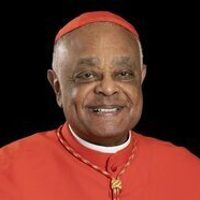(This is the text of a statement from Washington Archbishop Wilton Gregory read during the Catholic Mobilizing Network’s Sept. 24, 2020 Virtual Prayer Vigil against Federal Executions. Archbishop Gregory’s statement was read by Kathryn Windels, Director of Life Issues for the Archdiocese of Washington. The Catholic Mobilizing Network in promoting the prayer vigil noted that day’s vigil would hold in prayer Christopher Vialva and also his victims, Todd and Stacie Bagley, their loved ones, and “all those impacted by these acts of state-sanctioned violence.” The network noted that since the federal government resumed the practice of executions on July 14, 2020 for the first time in 17 years, six people have been executed -- more than doubling the total number of executions carried out by the federal government during the 57 years prior to the 2020 restart. Vialva, who is now 40, was sentenced 20 years ago for murdering two youth ministers in 1999 in Texas when he was 19. If he is executed Sept. 24 at a federal prison in Terre Haute, Indiana, CNN reported that this will mark the first time in almost 70 years that the United States will execute someone for a crime committed as a teenager.)
Today, we pray for Mr. Christopher Vialva, who awaits execution, and for an end to capital punishment in the United States. We pray in a special way for his family, that they might find consolation in the love of God. We remember the souls of Todd and Stacie Bagley, and pray for the comfort of their family and friends. We pray in a special way for the conversion of our own hearts and minds, as we seek to grasp the endless compassion and mercy of God in our country and world today.
‘I desire mercy, not sacrifice.’ For I have come to call not the righteous but sinners” (Matthew 9:13). The Gospel of Jesus Christ teaches us that, although our personal capacity for forgiveness is limited, God’s mercy truly is endless and enduring. Even the most reprehensible actions do not diminish our humanity, and they certainly do not limit God’s capacity to show love and mercy.
This mercy, found at the heart of the Gospel, reminds us that each human person, from conception until natural death, is equally deserving of life and human dignity. These values cannot be compromised for the sake of retribution, vengeance, or even a false sense of consistency in our legal system.
Taking a life, even the life of a person guilty of a terrible crime, is a continuation of the violence that denigrates the dignity of all people in the world. The death penalty does not erase past harm, but only serves to make each of us complicit in a new act of violence.
Taking the life of another human being harms each one of us, defying the sanctity of human life and devaluing our worth as God’s own creation. The death penalty damages our culture and turns our government into a system of retribution, when it should be a system of support and service to its people. As a community of the faithful, we are all harmed by the death penalty.
In the United States today, the race of both the perpetrator and victim continue to play a role in how crimes are tried in our criminal justice system. Crimes committed by people of color, especially crimes against white women, are more likely to become capital cases. Statistically, Black Americans represent 13% of the total population, but make up 42% of inmates on death row. Racial bias, like in Mr. Vialva’s case, leads to a serious judgment placed on someone’s life and personal value.
In cases involving the death penalty, the solution is a permanent one. The death penalty ends a life. The impact of prejudice or bias, and the possibility of wrongful conviction, should be reason enough to end the use of the capital punishment.
Catholic teaching has consistently opposed the use of capital punishment in the United States (Catechism of the Catholic Church, 2267), and our culture has increasingly grown to support these teachings as more states have repealed the death penalty on a bipartisan basis. The reinstated federal death penalty stands in direct contrast to the views of Catholics and the American people.
As Christians, we have been taught to celebrate God’s creation. The unborn child, the sick, the disabled, the immigrant, and the convicted prisoner on death row are all equally deserving of God’s love. The myth of human innocence in a world of sin tries to pretend that some of these lives are more valuable than others. However, the reality of God’s love and mercy reminds us that we cannot weigh one life against another. Above all, we are called to a radical witness and practice of mercy. This witness of mercy is a nonnegotiable part of our faith because Christ commands us to be merciful.
Today, we pray for the state’s protection of Mr. Vialva and all others on death row. Only our act of forgiveness and mercy can be an antidote to the violence that surrounds us.












